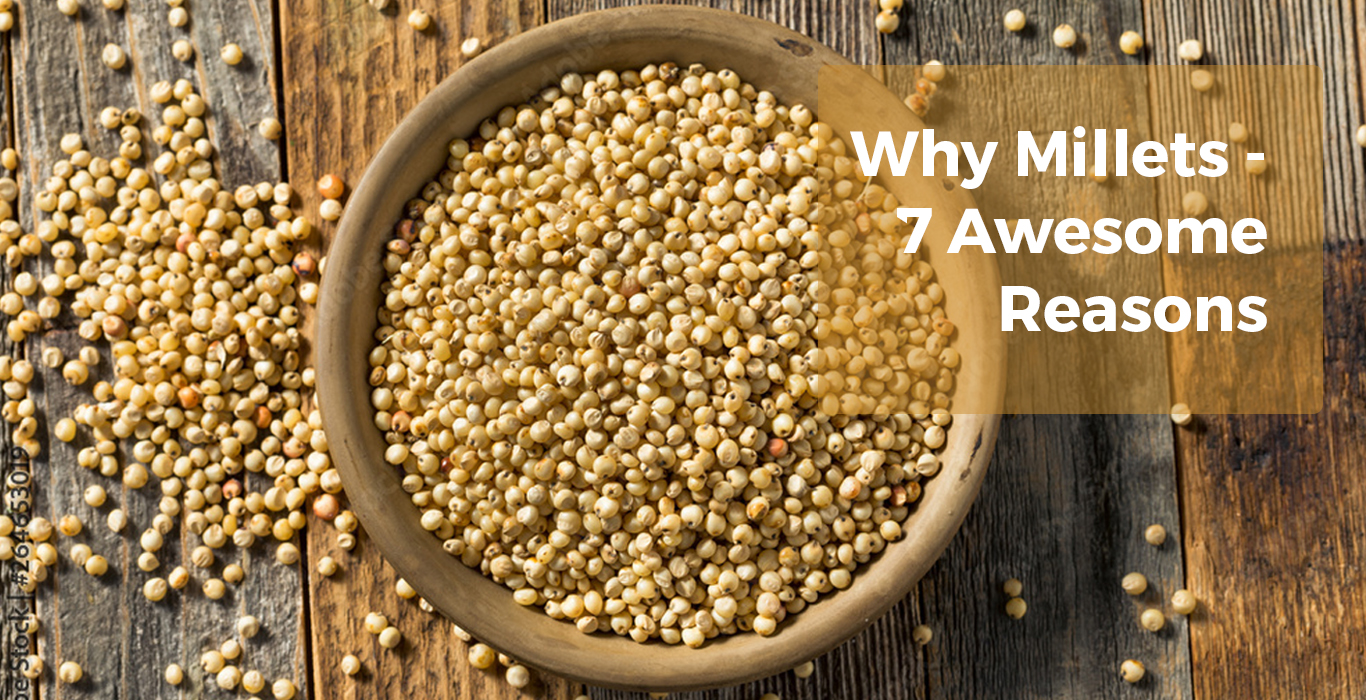Why Millets? Here are 7 awesome reasons to include them in your diet
Millets have made a majestic comeback in recent years, after almost being forgotten as our diet staples for many decades, due to policies that promoted the commercially profitable cultivation of rice & wheat during the Green Revolution. It didn’t take us too long for us to get used to the ease of cooking & alluring taste of the refined versions of rice & wheat, which quickly come to our minds when we think of any Indian main course. However, millets are being rightly re-christened as modern superfoods today. And we just cannot stop appreciating why millets deserve to make a grand re-entry to our diet, thanks to the host of health benefits they come with.
Millets & Ayurveda – A Beautifully Healthy Tale
From the Ayurvedic standpoint, millets are regarded as pleasant to taste, dry on texture & light for digestion. Hence, they are also believed to balance the 3 Doshas in the human body – Vatha, Pitta & Kapha. Millets have also been helmed as ‘Satwik’ food in Ayurveda.
More so, mirroring modern research, for centuries, Ayurveda has revered millets as food that manifests as medicine & is effective in treating the issues related to health:
Why Millets are so good for You?
Controlling Blood Sugar
Millets, when soaked & cooked with healthy spices or even-tempered with Ghee, bear a very low Glycemic Index (GI). Besides, since these are non-starchy polysaccharides rich in fiber, they are ideal for Diabetics or anybody trying to control their blood sugar.
A study conducted with 105 people with Diabetes showed that replacing regular rice-based breakfast with a millet-based one, helped in reducing their after-meal blood sugar level.
Ideal for people with Celiac Disease / Gluten-Sensitivity
If you’re someone with gluten sensitivity or Celiac Disease, millets are naturally excellent carbs for you.
Reducing Bad Cholesterol
Millet contains soluble fiber which produces a viscous substance in the gut. This traps fats and helps to reduce cholesterol levels. Not just that, the protein content in millets also is responsible for lowering bad cholesterol.
PCOS help
Since diet plays a pivotal role in managing lifestyle diseases, women with PCOS can benefit tremendously by including millets in their daily diet. These whole grains with low GI help & are low on acid, they are a nourishing food for PCOS & also help in reversing the adverse symptoms of this hormonal condition that often makes it challenging to keep insulin & body fat level under check. Millets are therefore also instrumental in weight management, which becomes relatively difficult if one suffers from PCOS or Insulin-Resistance.
Managing Anemia
Most of the millets such as Ragi, Kodo, Foxtail Millet & Barnyard millets are a rich source of Folic acid & Iron, which help prevent & fight Anemia, thereby also boosting one’s fertility.
Stronger Bones & Nerves!
Iron & Calcium deficiency can result in conditions like Osteoporosis, frequent muscle spasms & also neurological diseases like Alzheimer’s & Parkinson’s Disease. Consumption of millets can potentially prevent the incidence of developing these conditions later in life.
Natural Anti-Ageing
Millets are a good source of antioxidants. Antioxidants help fight the free radicals in our body and slow the process of aging in our body. Eat millets to feel and look younger.
What Nutrition Experts think about Millets
Celebrated nutritionist Rujuta Diwekar, who has always championed the wisdom of eating local food to be healthy, gives us pretty compelling reasons to make millets a regular part of our life.
She tells us that millets bootstrap a whole lot of essential fiber, amino acids, vitamins & minerals. However, Diwekar recommends consuming one millet at a time, unlike the cursory trend of trying & eating multigrain stuff, or even any commercially branded ‘multigrain’ millet bread.
At the same time, she also maintains that replacing rice or wheat with millets is not something that you must be doing. Instead, she advises consuming millets in moderate quantities, preferably soaked for some time before cooking. Or using millet flours to make ‘bhakris’, which can be enjoyed with healthy fats like Ghee or an Indian chutney, which are good being high in probiotics.
Additionally, Pooja Makhija, a well-known Mumbai-based nutritionist says that for people who experience bloating, indigestion, and excessive flatulence with or without gluten sensitivity or Celiac Disease, millets are a great choice to switch to.
Furthermore, Makhija explains “Each of us has a different gut bacteria and it is important for us to understand what our bodies can and cannot tolerate.”
We hope these reasons are good enough to explain Why Millets? And how awesome they are! So what are you waiting for? Add those millets to your grocery list.







